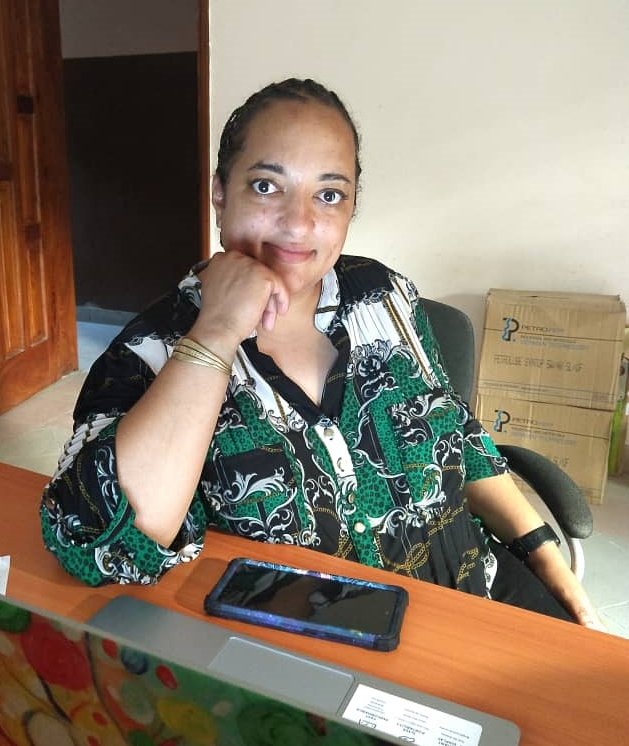Meet EPA Toxicologist Jocylin Pierro, Ph.D.

What research are you doing at EPA?
A lot of my work revolves around virtual tissue models. We create these virtual models to find out the toxicological effects of chemicals on human development. I focus on modeling embryos and finding alternative ways to do experimentation through models. We’re trying to model human embryos so we can use non-animal alternative models, also referred to as New Approach Methods (NAMs). As a toxicologist, I focus on finding out what the effects of the chemicals are on organisms through the models.
Tell us about your background.
My undergraduate degree was in sociology and I didn’t have much of a science background. However, my extracurriculars were environmental science focused—I started a recycling program in high school and in college, and participated in different groups to ameliorate how green the college campus was and combat local air pollution. I’d also participate in activities like picking up trash and protesting for causes like clean air and climate change. Then I went to the Peace Corps in Benin where I worked as a community natural resource advisor. I focused on waste management systems and reforestation efforts due to national deforestation issues. Waste management systems there possessed many toxicological issues regarding how to prevent toxic substances from the landfill from entering the water, and how to establish landfills that did not leach. This work furthered my interest in science and governmental policy. I decided to get a master’s degree in environmental science specializing in toxicology and risk assessment, and a master’s degree in public affairs with a focus on environmental policy and natural resource management at Indiana University. After I completed extensive toxicological projects and risk assessment activities, people suggested I get my doctorate due to my notable interest in research. I thought it was a good idea so I completed a doctorate in environmental toxicology at Texas Tech University. My research focused on sea turtle toxicology. I worked with cells and I would dose them with 3 different types of organic chemicals that are prevalent in the environment, including PFOA, and after I would take that toxicological data and create mathematical models that predicted the long-term effects of those chemicals on cells. We weren’t able to do long term in vitro experiments, so it opened up a new avenue through the predictive mathematical models. This work led to me acquiring a postdoctoral position at EPA focusing on computational toxicology.
How does your science matter?
Our science matters because the alternative methods and modeling we are working on are helping EPA move away from lab experimentation and building the future of toxicology. As we increase the accuracy of the models, we can rely on them for policy more. This research is also helping us determine if a relevant chemical is having developmental effects.
When did you first know you wanted to be a scientist?
I was planning on doing environmental policy, but I missed the challenges of science. At the end of my masters, I decided to pursue science to meet some of my intellectual interests. So, it was just through experience that I came to understand I wanted to be a scientist.
If you could have dinner with any scientist, past or present, who would it be? What would you ask?
I’m very practical, so I’m going to say one of my mentors because I feel like I haven’t talked to her in a while and it would be good to catch up. Her name is Diane Henshel, she was my professor at Indiana University and she’s part of how I ended up where I’m at.
If you weren’t a scientist, what would you be doing?
Either environmental policy or I would work with people with developmental disabilities.
If you could have one superpower, what would it be and why?
I would want to fly! I have so many dreams of flying and they seem so real that I feel like I’ve already flown.
Any advice for students considering a career in science?
Do extracurriculars and follow your passions because it will lead you to what you want to do for life. Even though I didn’t have a science background, it was my extracurriculars that allowed me to join the Peace Corps. If you’re curious about something don’t ignore it, go for it. Also try new things. Don’t be afraid to try new things because that’s how you find your passion. Sometimes if you don’t have a passion you have to try something to find them.
What do you think the coolest scientific discovery was and why?
I really like electricity. I lived in a country without electricity and it’s a big deal. Refrigerators too are a big deal. I’ve lived without a refrigerator as well. They’re very practical and it doesn’t seem like much but having lived in a developing nation and visited many, they’re a big deal.
What do you think is our biggest scientific challenge in the next 20/50/100 years?
Climate change. As the ice starts to melt, there will be new diseases released into the environment, and we have seen how we handle new viruses. A challenge more related to my work is increasing the accuracy of models that we are developing and getting them to a point where people can rely on them.
Editor's Note: The opinions expressed herein are those of the researcher alone. EPA does not endorse the opinions or positions expressed.
